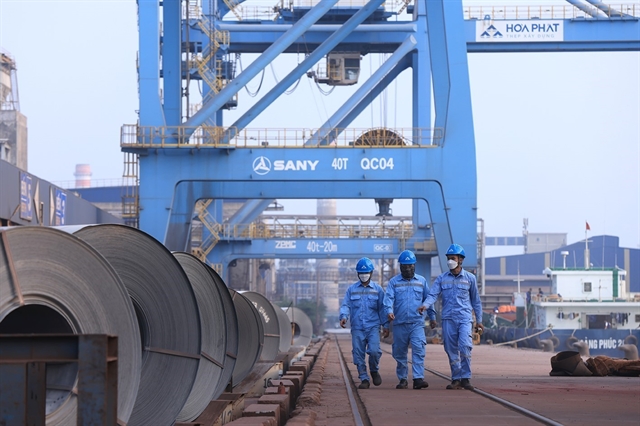 Economy
Economy

 |
| Trịnh Anh Tuấn, director of the Department of Trade Defence under the Ministry of Industry and Trade. |
While the influx of imported goods has presented challenges, with signs of dumping and subsidisation impacting domestic industries, Việt Nam has effectively countered these threats. By implementing reasonable trade defense measures, aligned with international commitments, the country has not only shielded domestic industries from unfair competition but also fostered their development and enhanced economic value.
Vietnam News Agency spoke with Trịnh Anh Tuấn, director of the Department of Trade Defence under the Ministry of Industry and Trade, to discuss the trade strategies being used to safeguard domestic production.
Việt Nam has implemented trade defence measures effectively, protecting the interests of various domestic manufacturing industries and markets. So, how effective are they?
To date, Việt Nam has conducted 29 trade defence investigations, including 20 anti-dumping cases, one anti-subsidy case, two anti-circumvention cases and six defence cases.
These measures have been vital in safeguarding domestic manufacturing industries, which contribute about 9.7 per cent of Việt Nam's GDP (based on 2023 estimates) and protecting the jobs of hundreds of thousands of workers. By implementing well-considered trade measures in accordance with international commitments, the country fosters a more favourable environment for domestic industries, shielding them from unfair competition and promoting growth, job creation, and economic value.
From a consumer standpoint, these long-term measures reduce the economy's reliance on imports, enhancing stability and resilience against external shocks. Additionally, effective trade defence strengthens Việt Nam's ability to leverage free trade agreements (FTAs) while mitigating the risk of anti-circumvention investigations by foreign countries, as Việt Nam proactively protects its domestic raw material sources.
What long-term strategies do you think State management agencies and manufacturing industries should adopt to boost trade defence capacity and support domestic goods?
The Ministry of Industry and Trade continuously monitors and implements trade defence measures based on the needs of domestic industries. This helps prevent unfair competition from imported goods in line with legal and international commitments.
For instance, the ministry is executing Decision No. 1659/QĐ-TTg, dated October 2, 2021, from the Prime Minister, which approves the project “Enhancing trade defence capacity in the context of new-generation free trade agreements.” This project focuses on providing information and improving knowledge about trade defence for domestic industries.
The ministry also collaborates with relevant associations and units to monitor production and import situations closely. This allows for timely action to protect the legitimate interests of domestic manufacturers.
Regarding investigations, the MoIT will continue to conduct them transparently and in accordance with the law, ensuring that all stakeholders' views are considered and that conclusions accurately reflect the situation. This is crucial to prevent unfair competition from imported goods.
Beyond the Government and MoIT's efforts, to minimise the negative impacts of trade defence measures, manufacturers and exporters should focus on market diversification. This approach avoids overreliance on a single market, promotes competition based on quality rather than price and reduces the risk of trade investigations.
Businesses should also consider the risks related to trade defence measures applied by foreign markets when developing production and export strategies. It is essential to understand trade defence laws and prepare resources to handle potential lawsuits. Monitoring warnings from the MoIT during the export process is also crucial.
Finally, businesses must strictly adhere to regulations on certificates of origin, avoid participating in origin fraud, and fully co-operate with investigation agencies. Close co-ordination with the MoIT is essential to effectively address trade cases.
What measures is the Ministry of Industry and Trade taking to support businesses and industries in expanding production while also safeguarding domestic industries?
The Ministry of Industry and Trade actively directs and collaborates with associations and localities to enhance the trade capabilities of the business community, aiming to mitigate negative impacts. This includes working with industry groups and local authorities to share information on trade defence, guide businesses on participating in trade defence cases and responding to requests from investigation agencies.
Additionally, the ministry is developing an early warning system to identify potential targets for trade defence investigations. This system provides warnings of risks so that businesses can prepare accordingly and it supports businesses during investigations involving Vietnamese exports.
If businesses require assistance, the ministry is ready to offer guidance and closely monitor the activities of foreign investigation agencies.
For investigations on imported goods, the ministry ensures a fair and transparent process that adheres to legal provisions and Việt Nam’s international trade commitments. The ministry will continue to consider the perspectives of all relevant parties and base conclusions on accurate data and evidence.
This approach aims to make objective and fair decisions that protect domestic industries while also considering the broader socio-economic impacts and effects on other manufacturing sectors. — VNS